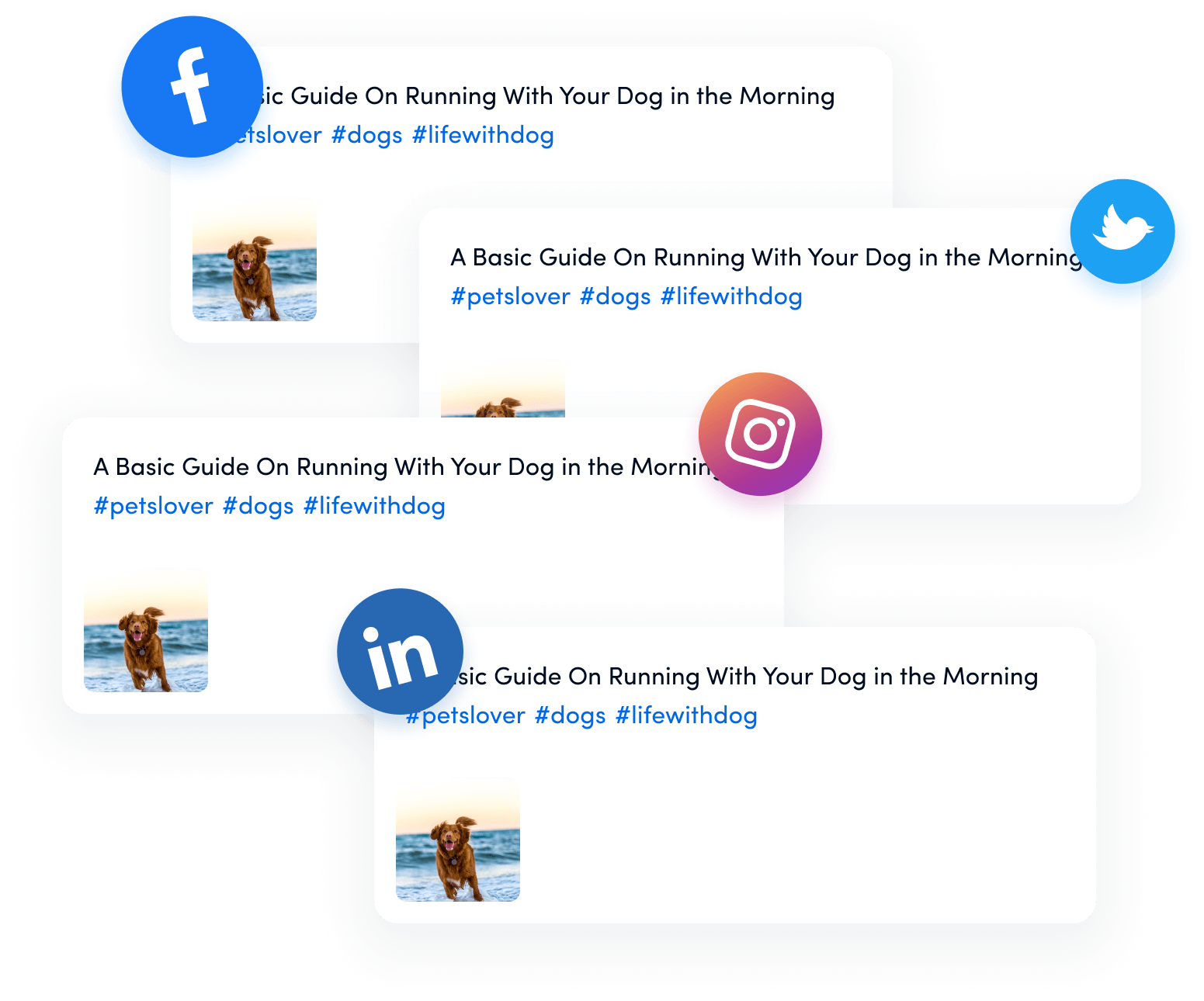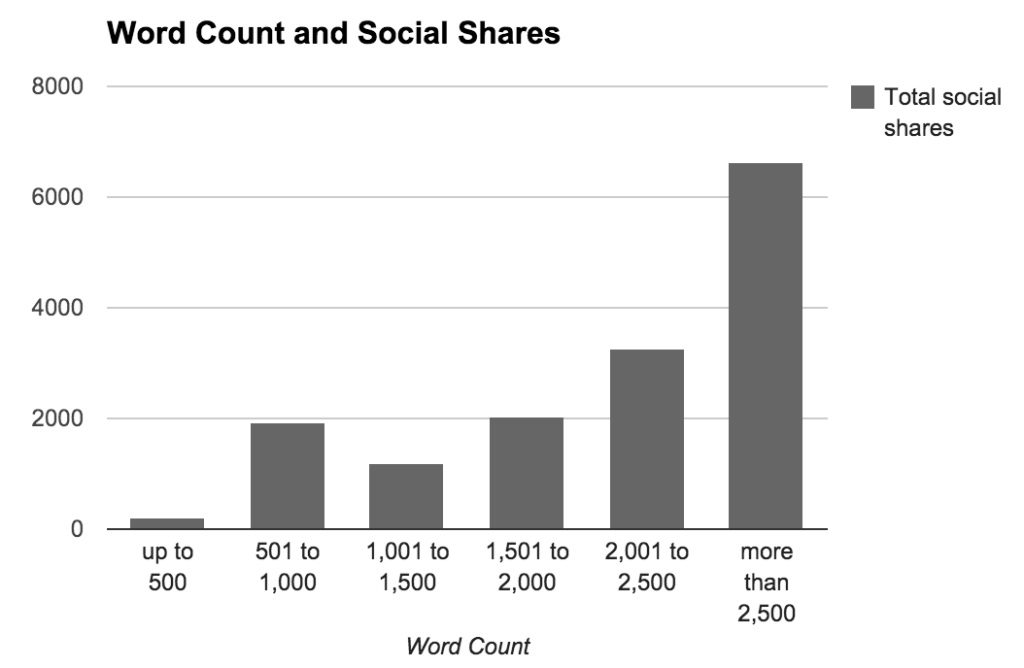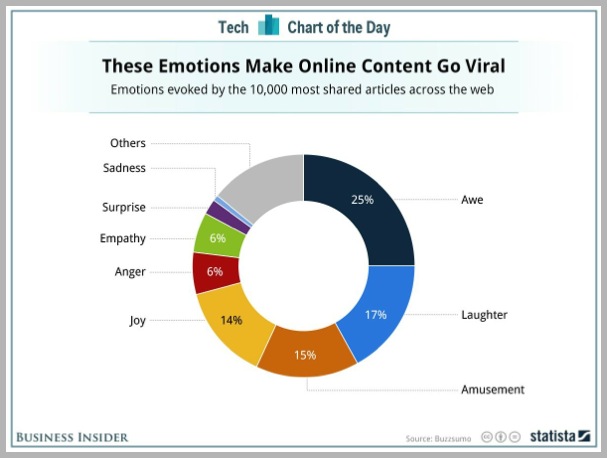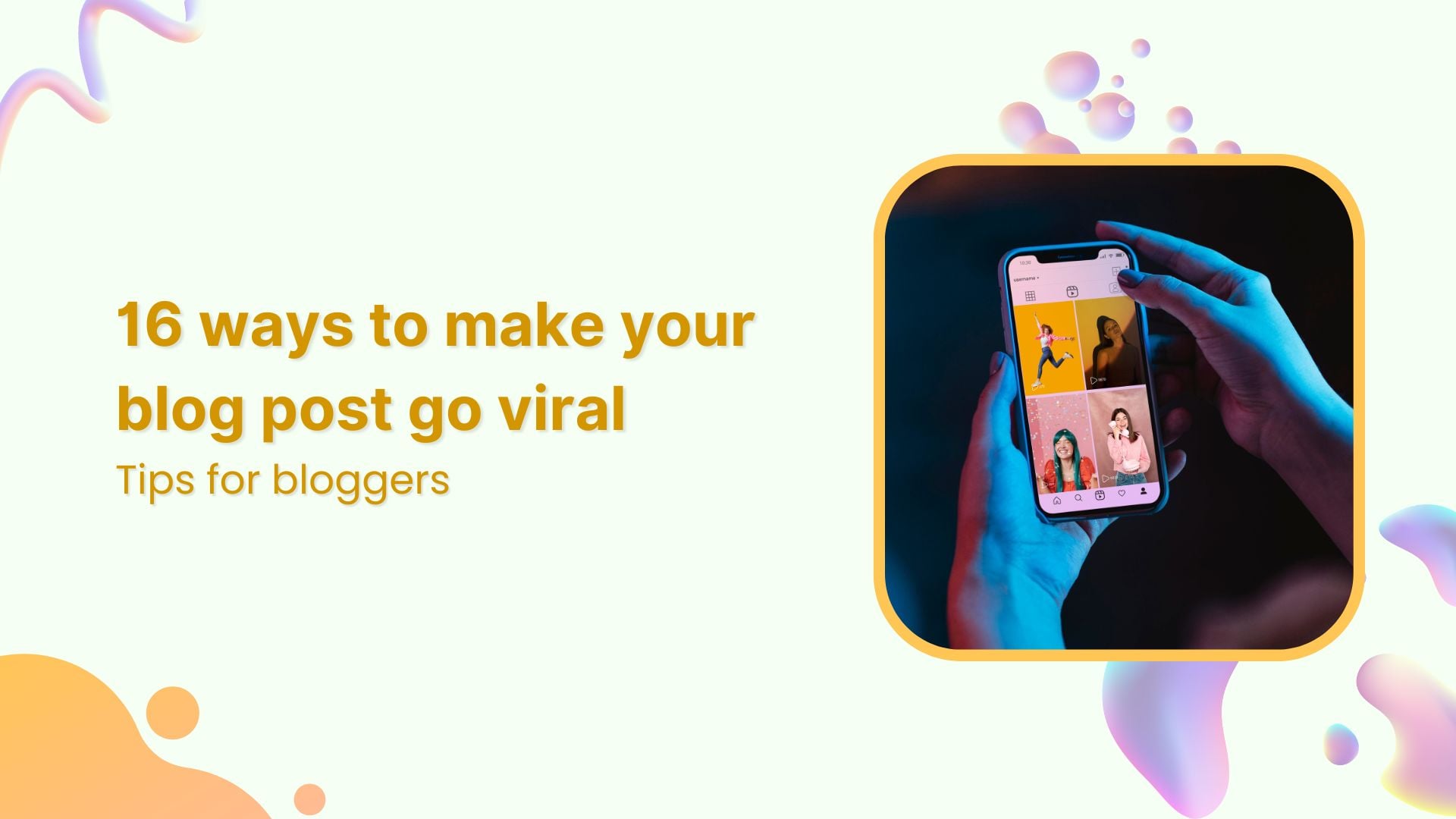Blogging is still one of the most reliable ways to reach, educate, and persuade your audience.
Every blogger dreams of that one breakout article that seems to make the rounds everywhere, sparks conversations, and keeps traffic rolling in long after it’s published.
There’s no guaranteed recipe to make your blog post go viral, but there are repeatable strategies that dramatically increase your odds.
Sometimes you pour your heart into a post, and it barely gets seen. Other times, a quick piece with half the effort suddenly explodes.
That gap often has less to do with luck and more to do with how well the content matches what readers care about, how it’s presented, and how it’s promoted.
Below, you’ll find a mix of foundational strategy and 16 practical tactics that can help you make your blog post go viral, grow your audience, and build long-term traffic.
Simplified social media marketing for individuals & agencies.

16 useful ways to make your blog post go viral
Creating a blog post that goes viral isn’t just about luck—it involves strategic planning, engaging content, and smart promotion.
Here are some detailed strategies to help your blog post reach a wider audience and potentially go viral:
1. Get to know your target audience
One of the most important things when writing a blog article that goes viral is “understanding your target audience”.
It means you should know exactly who you want to reach with your material. This entails learning about their preferences for certain types of content, as well as their interests, dislikes, and pain spots.
You can produce content that speaks to and meets the needs of your target audience directly when you have a thorough understanding of them.
This will make your blog piece more likely to go viral and guarantee that the information is pertinent and worthwhile for your audience.
Thus, invest some time in identifying and studying your target market, and you’ll see a spike in traffic to your blog posts!
2. Creating a captivating headline
One of the most crucial elements is crafting a compelling headline. Your headline serves as the first point of contact with readers, so it must be attention-grabbing, intriguing, and clear.
Incorporating numbers, questions, or strong adjectives can pique curiosity. At the same time, it’s essential to weave in relevant keywords for SEO purposes while ensuring the headline remains appealing and understandable to human readers.
Your headline, as the first thing a reader will see, has the power to make or break the success of your content. An attention-grabbing headline should make the piece’s topic obvious to the reader.
It should also appropriately represent the subject matter of your piece and be memorable and attention-grabbing.
The first step in having your content go viral is getting readers to click on it and read more, which may be accomplished with an attention-grabbing headline.
Thus, give your headlines some consideration, make them captivating, and watch as your blog entries begin to go viral!
Also Read: How to Craft Catchy Titles With YouTube Title Generator for Free?
3. Create and encourage shareable content
The key to “creating shareable content” is to write blog posts that are so engaging that readers will be compelled to forward them to their friends, family, and followers.
Content that can be shared widely is typically educational, amusing, emotive, or thought-provoking. The reader should gain something from it that makes them want to recommend it to others.
When creating shareable content, consider the kind of content you would like to share with your own network. This might be anything that appeals to your target audience from a humorous joke to a thoroughly researched article.
Aim to produce content your readers will want to share, and your blog post will go viral.
What else can you do?
- Include social sharing buttons prominently on your post.
- Craft tweets, Facebook posts, or Instagram stories related to your blog post and encourage followers to share.
- Run contests or giveaways that require sharing your post for entry.
4. Include images in your content
When you add images to your articles, people find it easy to read and get the most out of your articles in the minimum time.
Make sure that the images are of high quality and provide some value to the user. You are always advised to use the images you have taken or designed yourself because uniqueness is the key here.
If an image has already been seen by the masses, most likely, it will create a negative impact, making your content fall into the sub-standard category.
As an alternative, you can always find good-quality and highly relevant images from online photo-sharing websites such as Flickr and Freepik absolutely free of cost.
Due to their huge database of photos and continuous updates, it is highly unlikely that you won’t find a rarely used image. To create social media posts, here are 21 of the best online tools for creating social media graphics!
According to Ryan Salomon from Kissmetrics, content with highly relevant images gets 94% more exposure than content without those images.
And did you forget about the social media tags for Facebook? According to our analysis, posts that used Facebook preview image tags received 3 times more likes and shares compared to those posts that didn’t have a relevant preview image.
Key Point: Add at least one image to every post you make, and remember to include social media tags.
5. Add a video to your article
People love to watch videos rather than the same content presented to them in textual format. More importantly, videos are extremely useful to help people identify problems and present them with solutions to those problems.
Videos undoubtedly help improve conversion rates by a healthy percentage. With the rise of Instagram reels, short-form TikTok videos, and YouTube shorts, video marketing is essential now more than ever, not only on social media platforms but also in your blog.
P.S. YouTube alone has more than 38 million active channels!
You can use any type of video, such as explainer videos, customer testimonials, tutorials, or demonstration videos. A study reveals that adding video along with your content has proven to increase conversion by 86%.
Make sure that the video is of high quality. It is highly likely to serve as the main component in your brand recognition and enhancement. It should also go well with your brand, aesthetically speaking.
Related Read: How to Make Short-Form Video Content That Stands Out
Key point: Consider creating videos or live streams related to your blog post.
6. Infographics and lists get massive shares
There was an analysis done by Buzzsumo in which they compared 6 different types of content that included:
- Lists
- Infographics
- Videos
- How-to posts
- Why posts
- What posts
You would be surprised to know that Infographics topped the results while lists were the runners-up. Here is the complete bar graph.

It is obvious that infographics are much more appealing and easy to digest than other types of content. Users can more efficiently extract stats from them with visual charts and images.
Bloggers always love to see new infographics, and there are much higher chances of these going viral on social media platforms.
But it is highly surprising to learn that lists perform far better than how-to posts or even videos.
One reason could be that lists give an exact idea as to what sort of and how much content is being provided in the article (e.g., 10 easy ways to do this…), and more importantly, lists are easy to read and digest for most people.
Key point: Present stats in the form of visually appealing infographics and add structured lists to your content.
7. Keep an engaging writing tone
This refers to the process of connecting with your readers using language and style to enhance the attraction of your information.
Instead of just reading a boring article, an interesting tone gives the reader the impression that they are conversing with the author.
Use conversational language and humor, and write as though you are speaking to your reader directly to create engaging writing.
Steer clear of employing complicated or technical language that could turn off your readers. Rather, concentrate on establishing a warm, inviting tone that puts the reader at ease.
Writing in an interesting tone will keep readers interested, boost interaction, and raise the likelihood that your content will become viral.
If you find it difficult to create such a tone, you may find it helpful to get help from online tools like AI Paraphraser.
Using different paraphrasing modes from AI Paraphraser can help you achieve an engaging writing tone that resonates with your audience.
Read Up: Top 15 ChatGPT Alternatives To Transform Your Writing Experience
8. Make use of polls and quizzes
You must have seen those quizzes in your news feed on Facebook, where a friend of yours recently found out through a quiz that he is going to die in 2049.
Well, have you taken any such type of quiz yourself? If not, then go through the whole process once and try to learn different aspects of a quiz from a marketing point of view.
You will get to know that they are one of the most easily shared content on Facebook.
“We find that when people take one quiz, they want to take more,” said Melissa Rosenthal at BuzzFeed.
Did you know that some of Buzzfeed’s most shared posts are actually quizzes? Well, there is nothing too hard to digest because quizzes are so popular these days.
They are fun and give people a way to learn more about themselves and their friends.
So, quizzes can be a valuable tool for increasing traffic to your content and ultimately making it go viral.
9. Go with long-form content for more attention
Everybody is talking about above-the-fold content, and there is no denying that above-the-fold content is important, but what about the rest of the content?
Can you get an ideal conversion rate by throwing all of the information at the top section of your web page?
Don’t get me wrong. I’m a big practitioner of simplicity and a to-the-point approach. Surprisingly, the results say the opposite.
When we analyzed and compared long-form content with short, concise content, we found that long-form content was shared at a much higher rate.

Recently, we have seen that Google also tends to love long-form content and ranks those posts even better.
Google knows that long articles provide more value to a website’s visitors by going into deep details of the topic.
In fact, multiple reports show that content over 2,000 words is the way to go for companies looking to create evergreen content, as it ranks better in search engines and circulates on social networks for longer.
Key Point: Write as many detailed articles as you can, preferably over 2000 words
10. Invoke sentiments to get quick attention
Targeting your audience’s emotions has shown a great impact on content marketing. This technique allows you to quickly grab their attention and keep them hooked with your engaging copy.
We don’t have a scientific reason for this type of content to get more engagement. However, according to different research studies carried out in the past, people share emotional content for different reasons. Some of them are:
- Positivity – What makes people feel good has a higher probability of being shared.
- Shock – Shocking facts and stories get shared widely
- Anger – Human nature wants to let everyone know what they are angry about.
Below is a pie chart from a business insider about the emotions that trigger more shares and likes.

Key Point: Add entertaining or shocking pieces of content to your articles
11. Make the most of social media to promote your blog posts
This is the point where most bloggers get it wrong and start to worry about ‘why is their posts not going viral?’
My only question to those people is, ‘Have you done enough to get your post in front of the right audience?’
Sharing on Facebook is not the only way to promote your content. In fact, it is the starting point.
You must share it on most social platforms, including Twitter, LinkedIn, Reddit, StumbleUpon, Quora, Google+, via newsletters, and any other way you can think of.
Promotion should never stop, even if you have to find niche-relevant blog posts to comment on with a link pointing back to your article.
If you can get your articles shared by an influencer who has a large number of followers, your content will likely get a massive amount of likes and re-shares.
Finding multiple such influencers can create a domino effect, making your post go viral quickly.
Brian Jackson shared a strategy that really caught my attention. According to him, he has used this strategy multiple times, and it has worked almost every time.
Basically, he published an article titled “An Entrepreneur Struggles with Ulcerative Colitis,” in which he described the emotional suffering he has gone through.
In the same article, he intentionally mentioned a non-profit organization named CCFA.
Later, he composed an email asking them to share his post and providing them with a reason that this article might help a lot of people fighting that certain disease.
Guess what happened next? Someone from CCFA decided to share his post on their social media, and overnight, his post views jumped from 18 to 2081 within 24 hours.
He got hundreds of emails, Twitter mentions, and even an interview request from Digestive Wellness.
Here is the full story if you are interested to read it.
Key Point: Promote your post in both traditional and non-traditional ways. Think outside the box!
12. Promoting reader engagement
Promoting or encouraging reader interaction refers to giving your readers chances to interact with your material and one another.
Engaged readers are more inclined to spread the word about your piece by sharing it and leaving comments.
To promote reader engagement, make sure to pose queries, strike up conversations, and produce material that entices readers to express their ideas and opinions.
To boost interaction, you can also add interactive components like surveys, quizzes, and polls.
Taking part in ongoing conversations and replying to comments can also foster a sense of community on your site.
Encouraging reader interaction will help you develop a devoted readership, boost engagement, and improve the likelihood that your content will become viral. Thus, don’t hesitate to inquire.
13. Making use of SEO best practices
Ensuring your blog post is search engine optimized, such as using Google, is what’s meant by “utilizing SEO best practices”—making it easy for people to find and readily search for your content.
A collection of methods known as SEO, or search engine optimization, can help you increase the exposure of your content in search results.
Among the most important SEO best practices are the use of pertinent keywords, the production of excellent content, and readability optimization.
Additionally, since this can impact your search engine position, ensure your blog loads quickly and is optimized for mobile devices. Don’t forget to include meta tags, meta descriptions, and alt text for images.
By employing SEO best practices, you may boost the likelihood that search engines and readers will find your content, improve blog traffic, and raise the possibility that it will become viral.
Thus, pay attention to SEO when crafting blog entries, and you’ll see your blog rise in the search results! Finally, setting up your blog on a cloud-based platform can significantly enhance your SEO strategy.
Platforms like DropinBlog come with built-in tools designed to boost search engine rankings, including keyword analysis, meta tagging, and seamless website integration.
These features simplify the technical aspects of SEO, allowing you to focus on what matters most—creating high-quality content.
Also Read: The Art of Social Media Optimization: Best Practices and Strategies
14. Unlock the power of email marketing
Building an email list and utilizing email marketing can further extend the reach of your blog post.
Send newsletters featuring your latest content, personalize emails for different segments of your audience, and include social sharing buttons within your emails for easy sharing.
Here’s how ContentStudio sends out its blogs:

15. Automate your process
If you share content on a regular basis, you should look towards automating different parts of the whole process.
I am not asking to make it a machine-dependent system, but at least you can automate some of the tasks that you have to do over and over again in a similar pattern.
This can be easily done using ContentStudio’s social media automation feature. Let’s say you have to research and discover content on a specific topic.
You can do this by making Google searches with relevant terms and then pulling out only the quality material from all the results provided by Google.
You can also cut down the time and effort it takes during the whole research process by using ContentStudio’s content discovery and content curation platform.

Build Trust with Curated Content
Discover, brand, and share the best content with your audience. Establish yourself as an authority and turn leads into loyal customers.
14 days free trial – no credit card requiredNot only this, but you can also easily curate content and then publish it to your WordPress blog from within the ContentStudio platform.
If you connect your social accounts with ContentStudio, it will automatically share all of your blog posts to your social media accounts.
It takes all the hassle away from your content curation and content marketing efforts.
You can spend the same time you saved through automation on some other promotional method that can help you attract more visitors to your blog.
Key Point: Automate as many tasks as you can.
16. Monitor and analyze results
Monitor the performance of your post to determine its level of success and areas for improvement.
You should monitor metrics like page views, engagement, social shares, and click-through rates to gauge the effectiveness of your viral content.
To find out more about how well your post is performing and what is and is not working, you may also use tools like Usermaven, social media insights, or other social media analytics tools that can provide valuable data on the performance of your post.
You can have a better knowledge of what attracts readers to your blog, what resonates with them, and what you can do to enhance your content by tracking the performance of your viral article.
You can then utilize this information to help you and guide your future blog posts.
Identify what worked well in terms of engagement, shares, and comments, and replicate these strategies in future posts. Learn from posts that didn’t perform as expected, and adjust your approach accordingly.
Implementing these strategies can significantly increase the likelihood of your blog post reaching a larger audience and gaining traction within your niche or beyond.
Final words
Creating a blog article that gains wide attention can reshape your traffic, your brand authority, and even your business.
By focusing on reader value first and then applying these 16 tactics plus solid research and a simple system, you greatly increase your chances of making your blog post go viral, expanding your reach, and attracting loyal readers who keep coming back.
Take one upcoming article and intentionally apply as many of these ideas as you can. Then review the results, refine your approach, and repeat. Over time, those “lucky” viral moments will feel far more intentional.
FAQs
What makes a blog post viral?
A viral post typically combines clear value for a specific audience, strong emotional or practical appeal, and effective promotion across the right channels.
Visual aids like infographics, videos, and photos significantly boost shareability, while smart SEO ensures people can discover your post organically.
How do I make a blog post go viral?
While you can’t guarantee virality, you can greatly improve your odds by knowing your target audience intimately and creating captivating headlines that demand attention. Focus on shareable content with compelling visuals, videos, and infographics.
Keep an engaging writing tone and promote heavily across social media platforms, encourage reader engagement, and implement SEO best practices.
What type of content goes viral?
Any content can potentially go viral if it reaches the right audience at the perfect moment, but certain formats consistently perform better.
Highly shareable list posts, practical how-to guides that solve real problems, emotional stories that resonate personally, and visual content like infographics and videos tend to spread most rapidly.
Why does content go viral?
Content typically goes viral when it triggers strong emotions, whether positive or negative, or solves a pressing problem in an easily shareable format.
The combination of emotional resonance, practical usefulness, perfect timing, and strategic promotion works together to push content beyond your usual audience into countless new networks.
How long does it take for a blog post to go viral?
There’s no fixed timeline for virality as it depends on numerous factors, including your existing audience size, promotion strategy, and content quality. Some posts explode within hours of publication, while others gain momentum gradually over days or weeks.
The initial 24-48 hours are crucial for promotion and engagement, but evergreen content can experience viral surges months or even years after publication.

Comments
2 responses to “16 ways to make your blog post go viral – tips for bloggers”
There is definately a great deal to find out about this issue.
I love all of the points you’ve made.
[…] On the flip side, sometimes, a blog post that you randomly publish, gets more exposure than you were expecting. Most of the times, you only find out once it plays out. Writing content, however, exposes you to the opportunities that could come your way. For instance, the blog post could go viral. […]